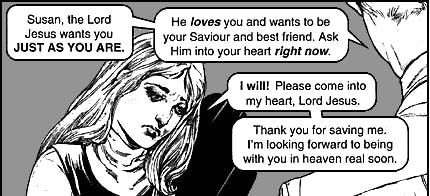Chick, who produced hundreds of fundamentalist Christian tracts over 50 years, passed yesterday at the age of 92. He was initially known for tracts like “This Was Your Life,” which used compelling and sometimes frightening visuals to depict fundamentalist beliefs about hell and salvation. His contribution to the Satanic Panic rightfully earned him public infamy, as did his fear-mongering about feminism, LGBT rights, New Age spirituality, and even Catholicism.
Chick was a true cultural separatist whose doctrinal views were heavily influenced by works like The Fundamentals and Charles Finney’s Power From On High. Only the King James Version of the Bible sufficed; Satan is directly responsible for all other translations. Catholics? They’ve eaten the infamous Death Cookie and are doomed to hell. Infant baptism? Dangerous heresy! Dungeons and Dragons? If you have to ask, you’ve probably got one foot in the lake of fire already.
A few of Chick’s views, specifically on abortion, evolution, and LGBT people, possess a pernicious longevity. He celebrated AIDS as just deserts for anyone who didn’t adhere to his stringent sexual standards—a sentiment 14 percent of Americans still believe:

But in other respects, his obsessive cultural puritanism has fallen out of vogue. There are still some proponents, found mostly in Independent Fundamentalist Baptist churches and institutions like Bob Jones University and Pensacola Christian College, but they’re a minority, doomed partially by their own separatism. Evangelicalism dominates.
With that domination came the cultural acquiescence Chick so feared. Conservative Catholics and Protestants are now allies in the culture wars, and the targets of that war have shifted a bit. Nobody cares about Dungeons and Dragons these days, and it’s been a long time since anyone publicly burned a Harry Potter book. Young evangelicals (no survey separates evangelicals from fundamentalists) are softer than older generations on issues like evolution and LGBT rights. That’s a strong indication that Chick’s version of Christianity is set to become increasingly obscure.
His tracts therefore provide an interesting perspective on conservative Protestantism’s American mutations: Chick once arguably sat within the movement’s mainstream, only to live long enough to see it leave him behind.
At least he was spared yet another Halloween.
